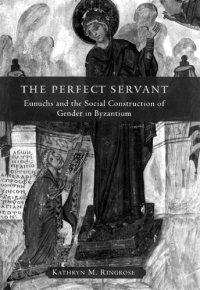
Ebook: The Perfect Servant: Eunuchs and the Social Construction of Gender in Byzantium
Author: Kathryn M. Ringrose
- Year: 2007
- Publisher: University of Chicago Press
- Language: English
- epub
The Perfect Servant reevaluates the place of eunuchs in Byzantium. Kathryn Ringrose uses the modern concept of gender as a social construct to identify eunuchs as a distinct gender and to illustrate how gender was defined in the Byzantine world. At the same time she explores the changing role of the eunuch in Byzantium from 600 to 1100.
Accepted for generations as a legitimate and functional part of Byzantine civilization, eunuchs were prominent in both the imperial court and the church. They were distinctive in physical appearance, dress, and manner and were considered uniquely suited for important roles in Byzantine life. Transcending conventional notions of male and female, eunuchs lived outside of normal patterns of procreation and inheritance and were assigned a unique capacity for mediating across social and spiritual boundaries. This allowed them to perform tasks from which prominent men and women were constrained, making them, in essence, perfect servants.
Written with precision and meticulously researched, The Perfect Servant will immediately take its place as a major study on Byzantium and the history of gender.
Review
“Ringrose’s book is a thoughtful, stimulating and non-sensationalist addition to the field. Ringrose examines eunuchs within a Byzantine context, the first full-length study to do so. She has two objectives: the first is to examine whether eunuchs were regarded as a distinct gender within Byzantine society; . . . the second is to explore how the roles played by eunuchs in society changed between the 7th and 12th centuries. . . . It is a book that anyone interested in gender roles and in Byzantine society needs to pay attention to.”
(Liz James Times Higher Education Supplement )
“Ringrose scours the literary sources to offer a history of the Byzantine eunuch that will surely remain the standard work on the subject for some time to come, and one that explores in detail how this fascinating phenomenon ramified within Byzantine culture.”
(Colin Wells Bryn Mawr Classical Review )
“Rather than focusing on the social relations of power in Byzantium, Ringrose locates her discussion in the realm of gender and especially in the Christian discourse on asceticism and sexuality. . . . In her conclusion, Ringrose appeals to the scriptural model of the eunuch as the perfect servant, but her book successfully exposes the much more complex and often contradictory range of ideas that eunuchs present in relation to gender issues within the late antique and Byzantine Christianity.”
(Averil Cameron Journal of Religion )
“Any book that can generate the number of underlinings and notations that my own copy now displays has already achieved a large part of its purpose. Ringrose is to be sincerely congratulated on that account, and any interest in or research into the Byzantine eunuch will do well to start with this impressive work.”
(Dean A, Miller Speculum )
" The Perfect Servant offers much to its readers. As the extensive bibliography and the analyses of the texts indicate, Ringrose has read widely and thought carefully about her subject. The major ideas she presents are usually clear, well substantiated . . . and worthy of serious consideration." (William N. Bonds Journal of the History of Sexuality ) --This text refers to an out of print or unavailable edition of this title.
From the Inside Flap
The Perfect Servant reevaluates the place of eunuchs in Byzantium. Kathryn Ringrose uses the modern concept of gender as a social construct to identify eunuchs as a distinct gender and to illustrate how gender was defined in the Byzantine world. At the same time she explores the changing role of the eunuch in Byzantium from 600 to 1100.
Accepted for generations as a legitimate and functional part of Byzantine civilization, eunuchs were prominent in both the imperial court and the church. They were distinctive in physical appearance, dress, and manner and were considered uniquely suited for important roles in Byzantine life. Transcending conventional notions of male and female, eunuchs lived outside of normal patterns of procreation and inheritance and were assigned a unique capacity for mediating across social and spiritual boundaries. This allowed them to perform tasks from which prominent men and women were constrained, making them, in essence, perfect servants.
Written with precision and meticulously researched, The Perfect Servant will immediately take its place as a major study on Byzantium and the history of gender. --This text refers to an out of print or unavailable edition of this title.
About the Author
Kathryn Ringrose is a lecturer in history at the University of California, San Diego. --This text refers to an out of print or unavailable edition of this title.